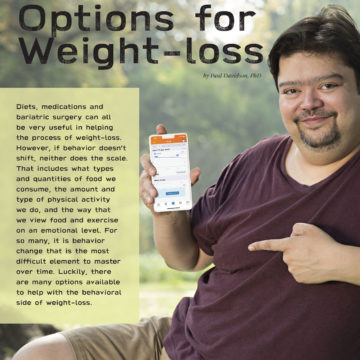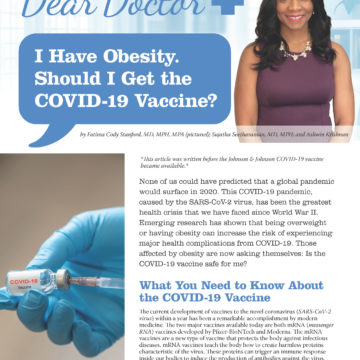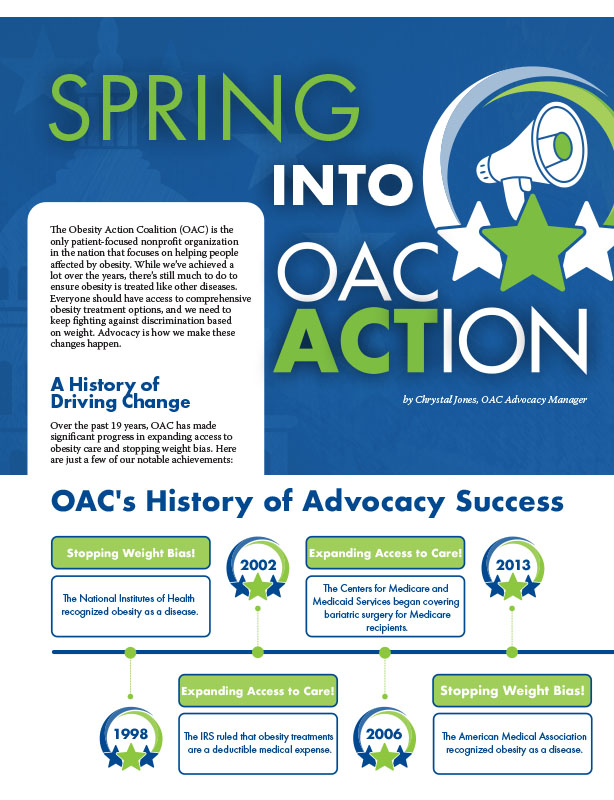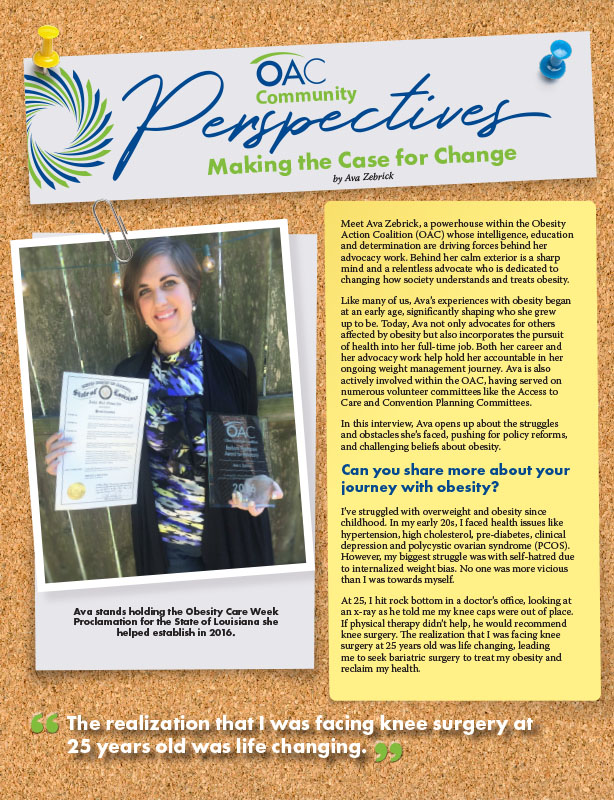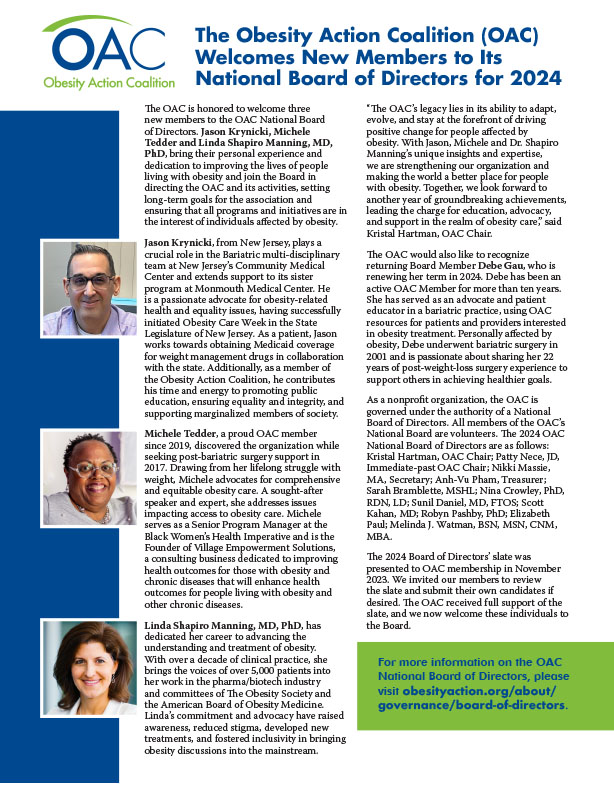OAC Community Perspectives: Overcoming Stigma to Find My Treatment Path

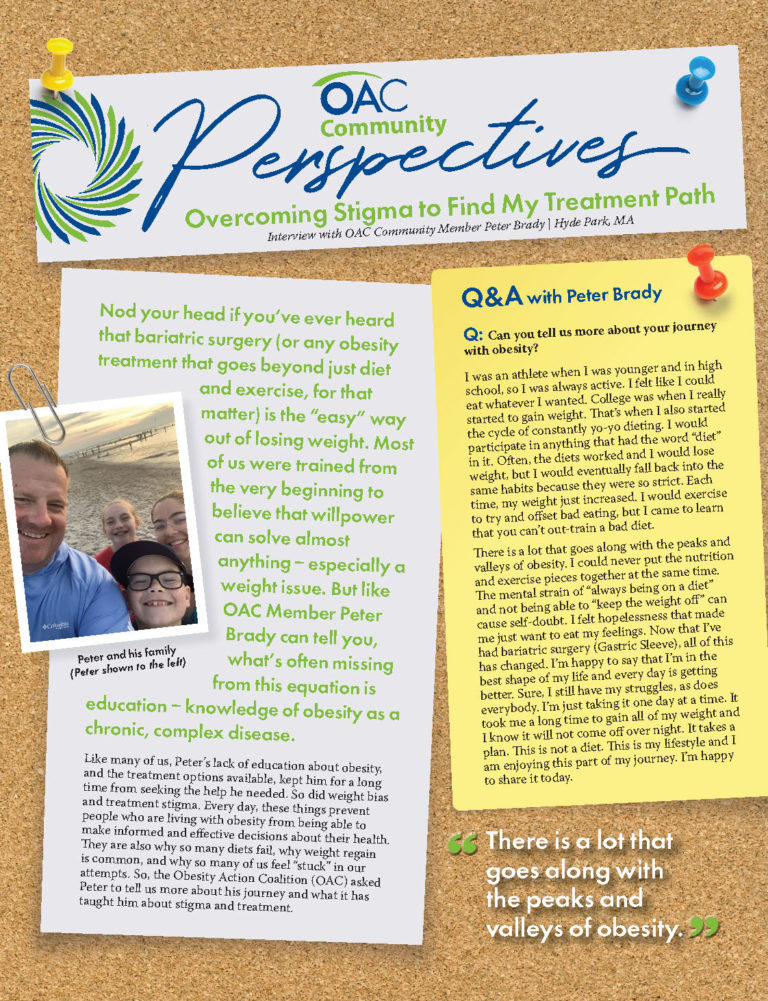
Interview with OAC Community Member Peter Brady
Spring 2021
Nod your head if you’ve ever heard that bariatric surgery (or any obesity treatment that goes beyond just diet and exercise, for that matter) is the “easy” way out of losing weight. Most of us were trained from the very beginning to believe that willpower can solve almost anything – especially a weight issue. But like OAC Member Peter Brady can tell you, what’s often missing from this equation is education – knowledge of obesity as a chronic, complex disease.
Like many of us, Peter’s lack of education about obesity, and the treatment options available, kept him for a long time from seeking the help he needed. So did weight bias and treatment stigma. Every day, these things prevent people who are living with obesity from being able to make informed and effective decisions about their health. They are also why so many diets fail, why weight regain is common, and why so many of us feel “stuck” in our attempts. So, the Obesity Action Coalition (OAC) asked Peter to tell us more about his journey and what it has taught him about stigma and treatment.
Q&A with Peter Brady
Q: Can you tell us more about your journey with obesity?
I was an athlete when I was younger and in high school, so I was always active. I felt like I could eat whatever I wanted. College was when I really started to gain weight. That’s when I also started the cycle of constantly yo-yo dieting. I would participate in anything that had the word “diet” in it. Often, the diets worked and I would lose weight, but I would eventually fall back into the same habits because they were so strict. Each time, my weight just increased. I would exercise to try and offset bad eating, but I came to learn that you can’t out-train a bad diet.
There is a lot that goes along with the peaks and valleys of obesity. I could never put the nutrition and exercise pieces together at the same time. The mental strain of “always being on a diet” and not being able to “keep the weight off” can cause self-doubt. I felt hopelessness that made me just want to eat my feelings. Now that I’ve had bariatric surgery (Gastric Sleeve), all of this has changed. I’m happy to say that I’m in the best shape of my life and every day is getting better. Sure, I still have my struggles, as does everybody. I’m just taking it one day at a time. It took me a long time to gain all of my weight and I know it will not come off over night. It takes a plan. This is not a diet. This is my lifestyle and I am enjoying this part of my journey. I’m happy to share it today.
Q: How did you make the decision to have bariatric surgery and what did that process look like for you?
It definitely wasn’t a rash decision. My doctor would bring it up at my yearly visit. At first, I was mad because I thought I should be able to lose weight on my own. I thought bariatric surgery was the “easy way out.” After the fourth time hearing it from my doctor and countless weight-loss attempts of my own, I decided that I needed help. I was uncomfortable and not sleeping well. I was tired and fearful that as a father, I wouldn’t be able to be there for my kids. I just wasn’t a healthy version for myself, my fiancé, my kids or my family. I had long taken care of everyone else. It was time to take care of myself. If I didn’t put myself first, how could I be there for anyone else?
I had to wrap my head around wanting to have bariatric surgery, but I was ready. I started by attending an informational session to learn how the process worked. I think that what people often perceive about bariatric surgery, and the reality of what it is, are two different things. The process of seeking treatment opened my eyes to seeing bariatric surgery as a tool that could help me be successful.
Q: You’ve said before that stigma toward obesity treatment and bariatric surgery affected your decision to seek help. How so?
Yes. I think that when it came to discussing my decision to have surgery, people would look at me and say, “Can’t you just do it on your own?” “You were an athlete.” “You’ve done it before.” “Are you scared?” “What if something happens during surgery?”
My response to them was that my biggest fear was what might happen if I didn’t have the surgery. Obviously, I needed help. I think that’s why it took me so long. In some ways, I felt like I was giving up and surgery was the last resort. What I really had was a lack of information, and that is what drives me to help people understand what seeking treatment for obesity is all about.
Q: To what degree do you think knowledge and education play a role in the decision-making process for managing obesity?
I think knowledge and education play a huge factor in what you do and don’t do. You really can’t make an informed decision if you don’t understand the situation. I think the mental health aspect of this process is something that should not be understated. The mental health process is work, too. With bariatric surgery, you will lose weight and many things will change – but it’s not uncommon to feel like part of you is still the same person struggling with severe obesity. In some ways, you may want that part of you to be there – to remind you not where you’ve been, but where you are going.
The weight bias that is often felt as a person struggling with obesity has a tendency to stick around and affect every decision that you make. But the OAC Community is amazing, and if more people in the world were aware of these resources, things might be different. Bariatric surgery can have so many benefits for the right person who is considering it. It’s definitely not easy, but the fruits of your labor can be tremendous.
Q: Do you see any differences between men and women in typical approaches to weight-loss, or the support they are offered?
That’s an interesting question! When you think about it, there wouldn’t appear to be any differences. I don’t know if there really are any, but I do know from experience that any support groups I am part of tend to be female-dominated. I think there has been an increased effort to target men as well in different forms of media. The lack of men in the bariatric community directly affects who is available for peer-to-peer support. Don’t get me wrong – I’ve learned a great deal from the women I have spoken with and am very thankful for any and all support. But being able to speak with men who have been in your shoes and are walking similar journeys is different. There are so many similarities, yet so many differences. That is what has been great about bariatric surgery for me, specifically. We are all facing similar struggles, but in the bariatric community, we have this fantastic tool that connects us.
Q: What would you tell someone who is looking for help to manage their weight but doesn’t know where to start?
Ask questions – lots of questions. And when you’re done, ask some more. Reach out to someone who has sought help for their obesity. Talk to your doctor. Talk to me! There are so many great tools out there – whatever those may look like for you. Everyone is different. It took me four years to seek help and decide on bariatric surgery. I didn’t even take my own advice. I didn’t learn as much as I could have. I didn’t educate myself. I made decisions, and a lack of decisions, based on my perceptions of what obesity treatment was or could be. Go online and research – just be careful with tools like social media. I think that when/if you are ready to try something, you will know just the right time and place. Look at your personal timeline and make your decision based on good information.
Do You Want to Share Your Story?
Whether you have a story about navigating obesity, facing weight stigma, or inspiring others, your voice is important. Visit the OAC’s story project at WeightoftheWorld.com to share one today. Not sure what to say? Consider one of our question prompts to guide you.
If you would like your story to be featured in a future issue of Weight Matters Magazine, please email membership@obesityaction.org.
by Chrystal Jones, OAC Advocacy Manager Spring 2024 The Obesity Action Coalition (OAC) is the only patient-focused…
Read Articleby Ava Zebrick Spring 2024 Meet Ava Zebrick, a powerhouse within the Obesity Action Coalition (OAC) whose…
Read ArticleThe OAC is honored to welcome three new members to the OAC National Board of Directors. Jason Krynicki,…
Read Article




